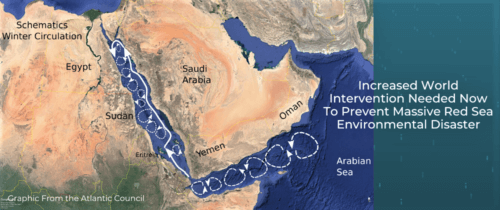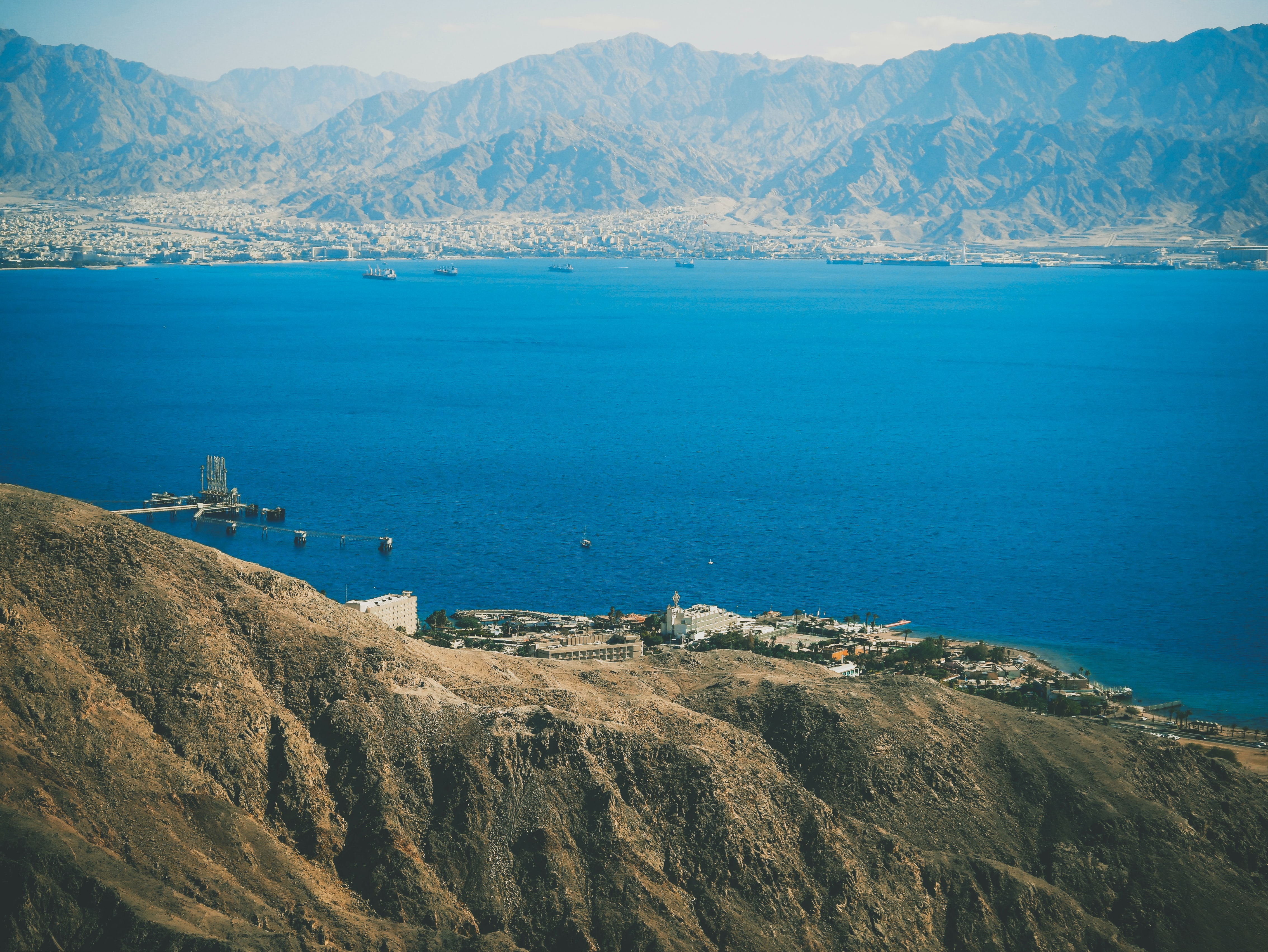By: Max Kaplan-Zentop and Dr. Adi Levy, Angle - Science and Environment News Agency

60 kilometers off the west coast of Yemen, a country currently in a brutal civil war, anchors an oil storage and unloading tanker named Safer. It has been there since 2015, when it was taken over by the Houthi rebels, a Shia-Zaidi terrorist organization supported by Iran and fighting the Yemeni government. Since that day, the tanker has not undergone any maintenance operations to prevent rust and damage to the hull, and researchers have expressed concern about its deteriorating condition.
Now, New report states that the tanker is closer than ever to a situation where the oil stored in it will begin to leak - and the results of such a scenario will be disastrous for nature and man.
The Red Sea is home to at least 365 species of stony corals, Boni Shonit Vand more than 1,000 species of fish along its coastline. Its coral reefs are classified as one of the ecosystems with the highest biological diversity and productivity in the world. Not only marine organisms depend on coral reefs, but also people. in fact, About 28 million people Life along the coastline throughout Yemen, Saudi Arabia, Jordan, Djibouti, Eritrea, Sudan, Egypt and Israel depends on the vast ecosystem of the Red Sea as a source of food and livelihood.
The annual revenues from tourism related to the Red Sea are estimated About 12 billion dollars and the annual value of The fishing industry in the Red Sea reaches about 230 million dollars. Apart from direct economic outputs, the rich biological diversity that Shim Soff contains also has the potential to lead to breakthroughs in the field of medicine through finding and extracting active natural substances. Such substances have been used in recent years to develop antiviral drugs and inhibit the growth of cancer cells from marine sponges in reefs in the Caribbean.
But beyond all these, the coral reefs play an extremely important role in terms of regulating the concentration of carbon dioxide in the Earth's atmosphere and for that reason they are also called the "rain forests of the sea", but like their counterparts from the land, the coral reefs are also threatened by a wide variety of factors produced by human activity such as Warming of sea water andOcean acidification (increase in water acidity) as part of climate change, increasing urbanization and development along the coast, discharge of sewage and drift into the sea and overexploitation of sea resources for fishing, aquaculture and energy production.

Corals are particularly sensitive to an increase in seawater temperature and an increase of approximately one degree Celsius above the average maximum temperature in the same area that will last for several weeks is enough to lead to coral bleaching (a condition in which the cooperative algae leave the coral tissue and leave it transparent with the white skeleton of the coral visible through it). In the bleached state, the corals lack their main energy supplier - the algae, and a significant part of these corals will die and the entire rich ecosystem that relies on them may collapse.
In recent years A warming event of the leading seawater occurs on average every six years For mass coral bleaching - of at least 30 percent of the coral cover in reefs around the world which involves massive coral mortality - compared to once about 25 to 30 years ago. So the world's coral reefs are currently one of the most threatened ecosystems due to the climate crisis.
Worse than the Exxon Valdez disaster
When examining the most negative scenarios of a spill from the Safer oil tanker, it can be compared to another dramatic event: the oil spill from the tanker Exxon Valdez in Alaska. In this event in 1989, 260 barrels of oil leaked into the sea off the coast of Alaska, Contaminated 1,300 kilometers of coastline and caused the death of hundreds of thousands of marine animals. Even thirty years later and after intensive cleanup efforts, traces of crude oil still remain in some areas of Alaska's Prince William Sound.
To-Safer which the Houthis have a storage capacity of About 1.148 million barrels of crude oil, more than 4 times the volume of Exxon Valdez. In addition, a massive spill during the winter months would be even more devastating because the winter currents could spread the oil farther up the Red Sea much more widely.
"The coral reefs are spread along almost all 4,000 kilometers of the coast of the Red Sea and surround many islands within it, so that oil spilled into the seawater in any region of the Red Sea will threaten these valuable ecosystems," says Prof. Mouz Fein from the Inter-University Institute of Marine Sciences and the Faculty of Sciences Life at Bar Ilan University, and the authors of the new report.
A geopolitical nightmare
So far, the Houthis have rejected all UN requests to board the tanker to inspect its condition and prepare contingency plans in case of a leak. The Under-Secretary General for Humanitarian Affairs at the United Nations, Mark Lowcock, is not optimistic about cooperation with the Houthis on this issue. He noted that the Houthis promised in August 2019 that UN personnel would be able to board the tanker and inspect it, but backed out the night before the UN inspection team was to board the ship. Beyond that, he added that the lack of proper cooperation harmed the UN's ability to take concrete steps to prevent the potential leak, despite multiple warnings against the deterioration of the ship's condition.
"Not only ecosystems in the Red Sea, and the livelihood of 28 million people are at stake. An oil spill of this magnitude could worsen the security situation in the region because vital and rare resources in the region would be contaminated," says Inger Anderson, Under-Secretary-General and Senior Director of the United Nations Environment Program (UNEP).
Anderson predicts that in the event of a spill, the entire fishing industry in Yemen will be affected within days and will cause an estimated $1.5 billion in damage over the next 25 years. She warns that a leak of this magnitude will also lead to the closure of Yemen's nearby port of Al Hudaydah for at least six months, and thus will cause the prices of food and fuel in Yemen to rise drastically. Other countries bordering the Red Sea will also be similarly affected.
"If a spill occurs we will have to pump the oil out of the sea and clean up the coastline, but it will take many years for the ecosystems and the economy to recover," says Anderson. "The problem is that the corona crisis meant that this issue, which carries the risk of a massive oil spill, dropped from the list of priorities of the countries in the region."
Can the damage be prevented??
"The only way to eradicate the threat of an oil leak from the Safer is to physically pump the oil out of the ship," says Martin Griffiths, the UN envoy to Yemen. "However, this requires inspections, repairs and proper maintenance in order to be able to discharge the oil safely before taking the damaged tanker out of use." Unfortunately, this response strategy does not come to fruition due to the Houthis' disobedience to the UN's demands.
The new report, Published in the scientific journal Frontier in Science Marine, warned of the disaster that could be caused by a leak from the oil tanker, but also added that about 4.8 million barrels of crude oil and petroleum distillates pass through the Red Sea every day. Its authors recommend the construction of an immediate strategy to prevent oil spills that will be specifically adapted to the sea currents of the Red Sea and urge international oil companies to contribute annually to a fund designed to prevent oil spills regulated by the United Nations.

Global efforts to expand the use of renewable energy and the abandonment of polluting fossil fuels are critical to the fight against the climate crisis but also to the future of coral reefs in general and the Red Sea in particular. It seems that the continued transportation of oil in tankers at sea will continue to threaten marine ecosystems and the lives of the people who depend on them in the coming years.
The leak in Yemen may not cause significant direct damage to the reefs in the north of the Gulf of Eilat, but the simple truth is that it is not the only one that needs to be prevented. A resumption of the massive flow of oil from tankers that will arrive from the Persian Gulf to the shores of Eilat and from there via an overland pipeline to the Mediterranean Sea, will dramatically increase the potential for oil spills that in the past were one of the dominant factors in damaging Eilat's coral reefs.
Our reefs in the Gulf of Eilat show a relatively high thermal resistance in the face of climate change, and it seems that they may even be among the last to survive the harsh climatic conditions that will prevail towards the end of the 21st century. This fact makes the reef in Eilat (which is also unique due to being the northernmost coral reef in the world) even more special and of utmost importance for conservation. Therefore, we must prevent as much as possible any further damage to it by human hands and quickly remove the additional risk of damage from oil leaks. A risk hovering over the coral reefs in the Red Sea and around the world which are also threatened today by the warming of the sea water and the acidification of the oceans due to the climate crisis.
the post Waiting for disaster in the Red Sea appeared first onangle
